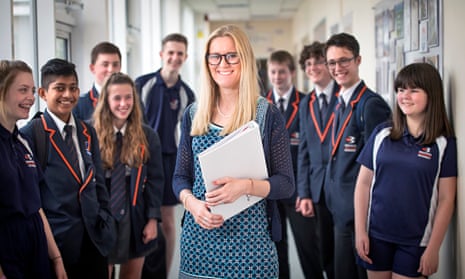“Miss, are you a lesbian?”
It’s never going to be your favourite question from a student. But at this moment, what could be worse? We were in the middle of filming a documentary, Mr Drew’s School for Boys, in a summer school for boys with behaviour problems. This was the one question I was hoping would not come up on camera.
I’d been working with the students for only three weeks and my sexuality was something I just did not want to deal with right now. I had not told any lies, but I had certainly been economical – evasive, perhaps – with the truth.
Now here we were, with TV cameras in front of us, and here was Tom, a boy with ADHD and a non-negotiable sense of right and wrong, whose question was not going to be brushed away. I could almost hear the whir of the zoom lenses focusing in on my face as I paused to consider the consequences of what I was about to say, potentially to two million viewers.
“Miss, are you a lesbian?”
“Yes,” came the reply.
“You’re a liar,” he said. And it was true – I had been lying by evasion.
As a teacher, when you’re in the company of children or teenagers all day, being openly gay can be pretty daunting. And here, there were cameras too. But now I’d said it and there was no going back. I desperately wanted for the kids not to care. I didn’t need their approval, but their disapproval would have stung.
The documentary aired and Channel 4 decided not to out me to the entire nation. But I have learned that, for me, it’s best to be open. Mostly, I have been lucky: on the whole, I’ve worked in schools with realistic staff and accepting students. Even Tom from the summer school was fine once I had explained myself. Supposedly, he was one of the most challenging children in the country, but he didn’t feel the need to challenge me. He told me my sexuality didn’t matter, that it was fine and that I should never try to hide it. And that’s the joy of being a teacher: sometimes, your students have more wisdom than you do.
Recalling the first time I was called a “fucking dyke” by a student still brings a sting to my face and so I had decided that, while filming, I would remain in the closet. This was just a summer school. The kids didn’t need to know my sexual orientation in order to work on their behaviour and their mathematics. But hiding such an integral part of me was hard while colleagues Mark, Ben, Dom and even Mr Drew himself so openly referred to their respective loved ones. So I referred to my partner in the plural “they” rather than “she” in the hope nobody would guess. You may think that seems ridiculous in 21st century Britain. But the same internal struggle is being felt by teachers all over the country every day.
Many (too many) are simply terrified of what it would mean for them if they were to be out at school. They’re afraid of leaving themselves vulnerable to personal remarks – ones that hurt – or of children asking for them not to be allowed in the PE changing rooms. These teachers are afraid parents will believe that, by talking openly about sexuality, they’re talking about sex and not about who people fall in love with.
Throughout my 10-year career, I’ve tried various approaches, hiding my sexuality and then eventually coming out in different schools – sometimes through choice, sometimes after an unhappy sighting of me in a bar by a parent. Word soon gets around.
As a newly qualified teacher, my outing was precipitated by a year 8 boy punching another boy in the face. The puncher arrived in my classroom, agitated, words pouring forth about the fact that he was going to be excluded.
“Why did you hit him?” I asked.
“He was slagging you off. He said … He said that you were a lesbian.”
The boy was crying. I put my sandwich down, readying myself to answer his question and hoping that my response wouldn’t make him feel that his attempt at chivalry was utterly wasted.
“I am.” Silence. “Oh shit,” he said.
I couldn’t help but laugh.
He received a fixed-term exclusion and I received a swarm of questions from all over. But the furore only lasted about a week: this was liberal Totnes, after all.
My next school was somewhat less right-on. I outed myself with the students midway through my first year. They received my news with a unanimous “whatever”. A number of staff members, on the other hand, were less blasé. Was it not inappropriate for me to have a picture of my girlfriend in my office? The pictures of their husbands and children were, of course, beyond reproach.
One day a member of the senior leadership team called me into the office to ask me to “act less gay”. Really. Now, as a lesbian who wears dresses and heels, has long blonde hair and painted nails, the only way that I could imagine acting “less gay” was to actually not be gay. Perhaps that was her hope. I resigned as head of the sixth form.
That taught me a lesson about not tolerating homophobia. Since then, I have been out in every school and talked openly with students about what it means when they use “gay” as a pejorative.
I feel I have normalised homosexuality for them. I’m not the lesbian teacher: I’m a teacher who happens to be a lesbian. And nobody cares. Or, at least, it seems that way. But if you dig a little deeper, you find a whole raft of students and adults who do care: the bi-curious girl in year 8; the year 11 boy who has just come out; the transgender student in year 10; the cleaner whose daughter has just moved in with her girlfriend. All these people are made to feel safer and more accepted because I am out and I am safe and I am accepted. Without a doubt, having an out teacher in a school is invaluable when discussing diversity and tackling homophobia.
Unfortunately, the fact remains that of all the gay teachers I know, I am the only one who is out in the classroom. The sad reality is that not every gay teacher feels able to be out with their colleagues, let alone their students, and asking them to come out for the good of future generations is a big ask. It is asking the most vulnerable of our workforce to put themselves in the firing line.
So what’s the solution? Surely, if things are going to continue to improve, staff need to bite the bullet? Well, yes. But what we also need is for heterosexual members of staff to shout the loudest. We need them to display Stonewall posters, openly refer to gay friends and relatives, remove the stigma of discussing sexuality – because they recognise that, despite the legalisation on gay adoption and gay marriage, facing your sexuality can be hard – for staff as well as students.
If we can achieve that, then maybe we will be some of the way to reducing the 90% of LGBT students who say they have been bullied because of their sexuality or the 40% who self-harm. Perhaps, we could even reach a point where the majority of LGBT staff don’t feel the need to lie or hide. Surely, in 2015, that’s a reasonable enough goal.







Comments (…)
Sign in or create your Guardian account to join the discussion